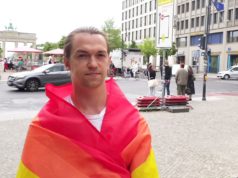The president of Budapest Pride passes away at the age of 42
The press release of Budapest Pride
Look how brave you are now! Szilvia Nagy, President of the Rainbow Mission Foundation behind Budapest Pride, has passed away..
“No one else will represent your interests the way you would. Similarly, if you live your life trying to please others, you’re not really living.” —Szilvia Nagy at the Budapest Pride Opening Ceremony, 2018

It is really difficult for us to write this text, because although we were expecting it, we cannot really prepare ourselves for losing Szilvi. We are grateful for knowing her.
How can 12 volunteers organize the Budapest Pride Parade and the one-month Budapest Pride Festival in meetings after work hours? How can this team also organize campaigns, move out to the countryside, carry out community organizing work and manage the nearly 300 volunteers throughout the year? Szilvi Nagy sought answers to these questions while she was building a humanly sustainable NGO.
Szilvia Nagy was born in 1977 in Miskolc. She recalled being a very well-behaved, diligent and reserved child, who wanted to live up to the expectations of her parents and her environment and did not have the courage to speak up and stand up for herself. She grew up in mandatory conformity, where you were expected not to cause any conflict or diverge from the norm. It took her a long time and a lot of work to get to a place where she was brave enough to be herself and stand up for herself and her own truth. As she recounted, two opposing forces compelled her: the fear of really showing herself and her imperfections, and the desire to be herself and connect with others.
After graduating from the Department of American Studies at Eötvös Loránd University in 2002, she worked as a web designer, graphic designer, and DJ. She later studied community building in the United States, which she carried over into her work at Budapest Pride. She was one of the founders and directors of the organization Flamingó Kör, the predecessor of Szimpozion Klub. She was among the founders of the Ösztrosokk lesbian party series in 2003 and was its regular DJ. Previously, she organized parties at her own place on Baross utca, and later at Cafe Eklektika, a favorite haunt of the lesbian community. From 2002 to 2006, she was a member of the Labrisz Lesbian Association and came up with the title Countercurrent (Szembeszél) for Labrisz’s first literary publication. Szilvi designed the original websites of Labrisz and LIFT (Festival of Lesbian Identities) and also ran the iconic website femfatal.hu. She joined the board of the Rainbow Mission Foundation as Labrisz’s delegate.
Szilvi had been an organizer of Budapest Pride since 2007, first focusing on the Budapest Pride Film Festival. In 2013, she became the President of the Rainbow Mission Foundation, the organization behind Budapest Pride. She was in charge of designing the Budapest Pride website and all of its visual materials. In 2013, Szilvi and her fellow organizers wrote Budapest Pride’s manifesto, laying down the foundation of the Budapest Pride organization we know today, built on feminist, anti-racist, and participatory democratic principles. In 2014, she coordinated the Hungarian LGBT Association’s campaign Hey there, will you go vote? (Szevasztok! Szavaztok?), which encouraged LGBTQ people to vote. To recognize her work in the community, she was awarded the Háttér Award in 2016 and LIFT Award in 2019.
Szilvi was diagnosed with cancer in 2016. She aimed to speak openly and truthfully about her illness, just like she did about other topics. She didn’t want cancer to isolate her from her community and friends and wanted to break the social taboo around cancer. She spoke about her illness publicly at the 2019 Budapest Pride Opening Ceremony.
Throughout her work, she often quoted Marshall Ganz, who teaches community organizing at Harvard: “Leadership is accepting responsibility to create conditions that enable others to achieve shared purpose in the face of uncertainty.” Szilvi based her work on the principle that the best advocates of a cause are self-advocates and that a key step in a minority group’s emancipation is advocating for itself. She often reminded us, “No matter what others say, your responsibility is to be your true self and express who you are.”
She has always been mindful about the importance of the community: as an LGBTQ person, we need to tackle the prejudices, malevolence, and political campaigns against us not alone, but together. She was proud that at Pride we take seriously that we are a community of constantly interacting people who have impact on eacher. She regularly emphasized our commitment to values such as kindness, empathy, and self-knowledge. When they said that Pride was communicating too positively, Szilvi reminded us that too much love doesn’t exist.
Szilvi was infinitely proud of the results of the national LGBTQ movement: the 300-man march from 1997 became a more than 20,000-man human rights demonstration. She was not not satisfied with tolerance, because there is always a “but” in tolerance. He drew our attention to the fact that tolerant people say, “I’m a tolerant person. I have nothing to do with gays, but don’t rub it under my nose. ”She warned us not to be satisfied with anything less than acceptance. It was an important value for Budapest Pride to demonstrate for the legal and social equality of LGBTQ people and to always remind ourselves why we are working for. Her postcard from the 2015 San Francisco Pride reflected this:
“Hey cuties”
This is how Szilvi addressed us in the postcard she sent the Budapest Pride team from San Francisco in 2015, during her time in the U.S. for a training on community building.“Greetings from San Francisco, which is not what it used to be, and where pride has become a shitty commercial event. May this remind us to always hold on to our values. Kisses, Szilvi”
Szilvi always warned us not to be scared of being called “provocateurs.” She believed that we were afraid of provoking because we had learned in this violent and distorted society that provocation might be followed by some form of retaliation. As they say, the victim of physical abuse “must have provoked” the perpetrator. But it is impossible to know in advance who we will provoke and how. With a sentence, a look, a handshake, a “no,” a “yes,” or exercising our freedom of assembly. She highlighted that provocation is actually a tool to confront prejudice. Isn’t it provocation when a same-sex couple holds hands on the street? When someone speaks publicly of their sexual orientation or gender identity? She reminded us that when we’re told not to provoke, we’re told basically not to exist, or if we do exist, to stay invisible. It is important that we not be deterred by this word and know that no retaliation is just or legitimate. Because without provocation, we, Budapest Pride, wouldn’t be here. And without provocation, we won’t be able to continue our work.
We are proud to continue the work that Szilvi has established and build the LGBTQ movement along the lines set by Szilvi. Szilvi’s great humor, huge heart, constant self-reflection and unwavering faith in the power of the community will always be with us.
The Budapest Pride team
Warm thanks for the English translation for 2 of our former organizers: Dodó Karsay and Melinda Széll





